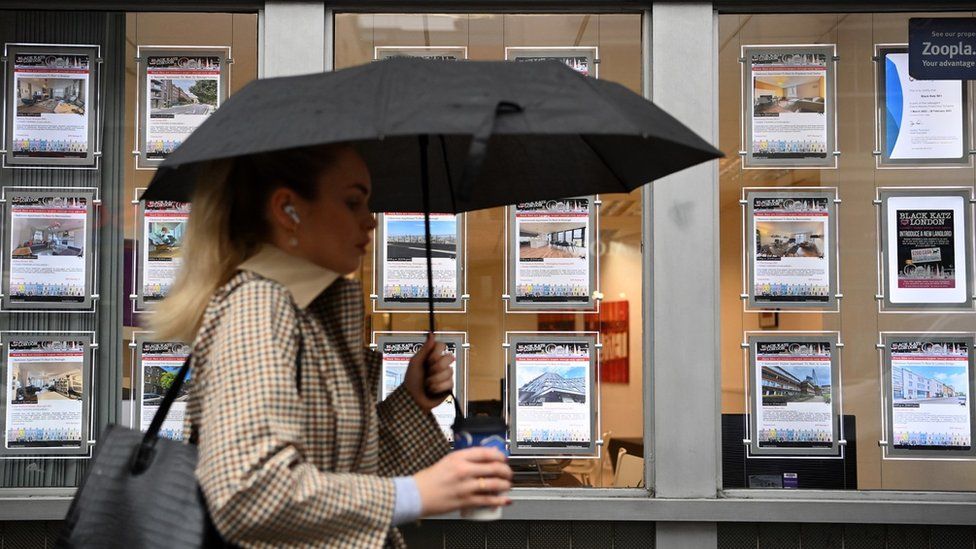
Rising interest rates means people looking to remortgage their homes will pay an average £2,900 a year more from 2024, a think tank has said.
The Resolution Foundation predicts the average two-year fixed rate deal will hit 6.25% later this year, leaving the UK in a “mortgage crunch”.
Around 800,000 people are expected to remortgage next year, the group said.
A Treasury spokesperson said it had “tailored support” for homeowners struggling to make their payments.
Borrowers are already facing big increases after lenders hiked rates over the past fortnight.
The Bank of England is expected to raise interest rates again next week.
Earlier this week, Chancellor Jeremy Hunt said the Bank had “no alternative” but to lift rates in its attempt to tackle inflation and curb rising prices.
The Bank of England’s base rate is currently at 4.5%, but the Resolution Foundation says this is expected to peak at nearly 6% in mid-2024.
Those expectations have quickly filtered through into the mortgage market – with deals being withdrawn or replaced by ones with higher rates.
On Friday, financial data firm Moneyfacts said the average two-year fixed-rate loan for homeowners stood at 5.98%, compared with 3.14% a year earlier.
The Resolution Foundation, which is an independent think-tank focused on improving living standards for those on low to middle incomes, said it does not expect the average two-year mortgage deal to fall below 4.5% until the end of 2027.
This would “significantly increase the scale of the mortgage crunch currently unfolding”, it said.
As a whole, annual repayments are on track to be £15.8bn a year higher by 2026 compared with prior to when the Bank started its rate-raising cycle in December 2021.
The director of the Resolution Foundation, Torsten Bell, said people are often opting for longer terms when they remortgage.
He told BBC Radio 4’s Today programme: “People are asking for a longer mortgage to stop the pain turning up now by a way of higher mortgage bills.
“That helps them through some difficult times over the months and years, but the mortgage costs them significantly more overall.
“How households deal with that pain is whether they pay more now, or in the future.”
‘Living standards hit’
The think tank said about three-fifths of the increase in annual mortgage payments was yet to be passed on to households, as borrowers move off existing fixed-rate deals and on to new ones.
This was expected to deliver a “rolling living standards hit” to millions of households in the run-in to the next general election, it said.
In December the Bank of England said about four million UK households would face higher mortgage payments in 2023, with the average monthly bill rising by £250.
But that included households on tracker and variable rate mortgages, and the prediction was made at a time when the Bank of England’s base rate was lower.
The former governor of the Bank of England, Mark Carney, has put the high inflation inflation rates down to Brexit, saying it had triggered a “unique” adjustment that could take years to unwind.
He told the Daily Telegraph that he had “laid out in advance” his concerns about the UK leaving the EU, which would lead to “a weaker pound, higher inflation and weaker growth.”
Comparing the current situation with 1989, when interest rates reached almost 15%, the Resolution Foundation predicted this year’s rate rises would increase the cost of a typical mortgage by 3% of a typical household income, outstripping the 2.4% increase seen then.
But the organisation said the current mortgage crunch was less widespread than in previous shocks, which was “better news for the government”.
In 1989, although inflation was lower at 5.5%, nearly 40% of households owned a home with a mortgage and were therefore exposed to rising costs.
Now, with more older people owning their homes outright and fewer young people owning property at all, the share of households with a mortgage has fallen below 30%.
The Resolution Foundation’s Simon Pittaway said: “Market expectations that interest rates are going to rise even higher, and stay higher for longer, are having a major effect on the mortgage market.
“Of course, market expectations can be wrong, and rate rises may not turn out to be as bad as feared.”
Around 7.5 million people with a mortgage are expected to see their repayments rise by 2026, the think tank said.
A Treasury spokesperson said the government knows it is “a concerning time for mortgage holders.”
“The FCA (Financial Conduct Authority) requires lenders to offer tailored support to borrowers struggling to make their payments, and we continue to support mortgage holders through the Support for Mortgage Interest scheme.
“Behind this though is global inflation, continuing to eat away at incomes around the world, which is why the single biggest thing we can do to help families is to halve the rate this year.
“We are also supportive of the Bank of England in their independent decisions on interest rates, and continue to provide around £3,300 per household this year and next to help with rising costs.”

Have you been affected by rising mortgage costs? Share your experiences by emailing haveyoursay@bbc.co.uk.
Please include a contact number if you are willing to speak to a BBC journalist. You can also get in touch in the following ways:
- WhatsApp: +44 7756 165803
- Tweet: @BBC_HaveYourSay
- Upload pictures or video
- Please read our terms & conditions and privacy policy
If you are reading this page and can’t see the form you will need to visit the mobile version of the BBC website to submit your question or comment or you can email us at HaveYourSay@bbc.co.uk. Please include your name, age and location with any submission.

What happens if I miss a mortgage payment?
- A shortfall equivalent to two or more months’ repayments means you are officially in arrears
- Your lender must then treat you fairly by considering any requests about changing how you pay, perhaps with lower repayments for a short period
- Any arrangement you come to will be reflected on your credit file – affecting your ability to borrow money in the future

Related Topics
-
-
22 hours ago

-

